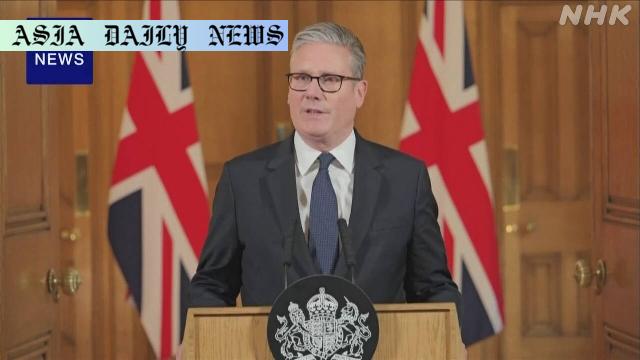Palestinian state – Britain to recognize a Palestinian state by September unless Israel takes substantive steps towards peace.
Britain announces intention to recognize a Palestinian state.
Action tied to Israel’s efforts to resolve the Gaza conflict.
UK joins France as a G7 nation signaling support for Palestine.
Recognition aimed at pressuring Israel and fostering peace in the region.

Britain’s Strategic Announcement on Recognizing Palestine
The British Prime Minister, Keir Starmer, has made an unexpected and bold declaration aimed at addressing the longstanding conflict between Israel and Palestine. Citing the urgent and worsening humanitarian crisis in Gaza, Britain has committed to recognizing a Palestinian state by September unless concrete actions are taken by Israel to ensure sustainable peace. This announcement positions Britain as the second G7 nation after France to adopt such a diplomatic stance, emphasizing a growing international consensus around the Palestinian statehood issue.
Britain’s decision to place recognition of Palestine on the international agenda is strategic. The announcement comes at a time when the humanitarian conditions in Gaza have reached critical levels. The UK has stipulated several key conditions for Israel to meet in order to avoid Britain recognizing Palestine unilaterally. These include allowing the United Nations to restart its supply mechanism for humanitarian resources into Gaza and committing to a ceasefire with Hamas. Such conditions are perceived as necessary to stabilize the region.
The Urgency Behind Gaza’s Crisis
Gaza, a narrow strip of land home to over two million people, has been suffering from prolonged humanitarian distress. Blockades, military escalations, and restricted movements have compounded challenges for the population. Britain’s demand that Israel permits United Nations humanitarian operations to resume is indicative of the dire need for relief in the region. Such assistance would deliver essential aid, including food, medical supplies, and sanitation, which Gaza desperately needs.
Beyond its humanitarian concerns, the ongoing crisis poses repercussions for regional peace and stability. The UK’s proactive stance could serve as a turning point, potentially urging other nations to join in pressuring Israel while fostering dialogue between conflicting sides. Britain’s move appears aimed at catalyzing changes on the ground, ensuring that peace efforts are restarted and the two-state solution remains viable.
Implications of Recognizing a Palestinian State
Recognizing a Palestinian state carries significant geopolitical consequences. It not only signals solidarity with Palestinian aspirations but also demonstrates Britain’s commitment to a peaceful resolution. Critics may argue that such recognition might alienate Israel, but proponents highlight that it adds pressure for constructive engagement rather than prolonged stalemates.
The recognition is not merely symbolic; it sets a precedent for other nations, especially within the G7 and the broader international community. It also prompts discussions about accountability and shared responsibility in ensuring the welfare of Gaza’s population, while safeguarding Israel’s legitimate security interests.
Conclusion: Path to Sustainable Peace
Britain’s decision to push forward with recognizing a Palestinian state could become a catalyst for reshaping the Israel-Palestine conflict. By tying its recognition to Israel’s tangible steps, the move aligns diplomatic leverage with humanitarian goals. However, much depends on the willingness of both sides to embrace dialogue and measures conducive to peace.
Whether or not this announcement will lead to substantive change remains uncertain. Yet, the UK’s proactive stance brings renewed international attention to resolving one of the world’s most protracted conflicts.
Commentary
Considering Britain’s Diplomatic Strategy
Prime Minister Keir Starmer’s announcement about potentially recognizing a Palestinian state by September marks a turning point in UK’s foreign policy. For years, Britain has tread carefully when it comes to the Israel-Palestine issue, aware of the complex historical and political tensions that accompany it. However, this recent move is indicative of the growing international frustration over the lack of progress towards peace and a two-state solution.
The humanitarian crisis in Gaza undoubtedly adds urgency to the situation. By tying its decision to Israel taking tangible steps, Britain signals that its motivation is not purely symbolic. Instead, it aims to address the conditions on the ground and spur both parties into negotiation. This strategy could be seen as utilizing diplomatic pressure in a constructive way, aligning international recognition with measurable outcomes such as a ceasefire and restoring humanitarian aid.
The International Impact of Recognizing Palestine
Britain’s potential recognition of a Palestinian state would have broader implications on the geopolitical stage. It positions the UK as a leading voice advocating for the rights of Palestinians and reflects a changing narrative within Western nations. With France already signaling its intention, the pressure may mount for other European nations and allies to follow suit.
However, Britain’s decision is not without risks. It could strain its relationship with Israel and potentially complicate broader Middle Eastern politics. Maintaining balance—between supporting Palestinian rights and ensuring Israel’s legitimate security concerns—will remain a delicate task for Britain.
Looking Forward
The announcement offers hope, albeit cautiously, for those advocating for a peaceful resolution to the Israel-Palestine conflict. It underscores the importance of international partnerships and coordinated efforts to address crises like that unfolding in Gaza. While challenges remain, Britain’s decision reflects an understanding that inaction is no longer viable, and proactive measures are essential for lasting peace.


